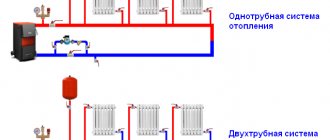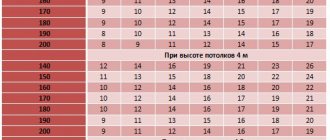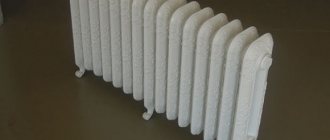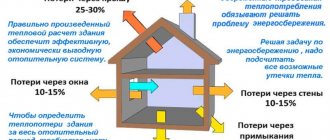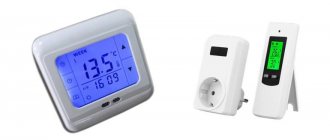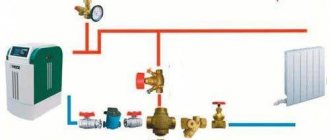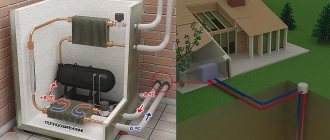What determines the amount of heat?
The internal energy of a body changes when work is performed or heat is transferred.
In the phenomenon of heat transfer, internal energy is transferred by conduction, convection or radiation. Each body, when heated or cooled (through heat transfer), gains or loses some amount of energy. Based on this, it is customary to call this amount of energy the amount of heat.
So, the amount of heat is the energy that a body gives or receives during the process of heat transfer.
How much heat is needed to heat water? Using a simple example, you can understand that heating different amounts of water will require different amounts of heat. Let's say we take two test tubes with 1 liter of water and 2 liters of water. In which case will more heat be required? In the second, where there are 2 liters of water in a test tube. The second test tube will take longer to heat up if we heat them with the same fire source.
Thus, the amount of heat depends on body mass. The greater the mass, the greater the amount of heat required for heating and, accordingly, the longer it takes to cool the body.
What else does the amount of heat depend on? Naturally, from the difference in body temperatures. But that is not all. After all, if we try to heat water or milk, we will need different amounts of time. That is, it turns out that the amount of heat depends on the substance of which the body consists.
As a result, it turns out that the amount of heat that is needed for heating or the amount of heat that is released when a body cools depends on its mass, on the change in temperature and on the type of substance of which the body is composed.
Physics test “Quantity of heat” 8th grade with answers
1. What is the amount of heat: a) energy that a body receives or gives up during heat transfer + b) energy received by a body when heated c) change in internal energy during radiation
2. Indicate the correct answer: The ice floe was given an amount of heat equal to 42000 J, as a result of which it warmed up by 10 degrees Celsius. The specific heat capacity of ice is 2100 J / (kg C). What is the mass of the ice floe: a) 1 kg b) 1.5 kg + c) 0.5 kg
3. What does the amount of heat depend on: a) the environment b) the density of the atmosphere c) the substance of which it consists +
4. Given a situation: There are two bodies of the same substance. The mass of the first body is twice the mass of the second body. What happens if the second body is given 2 times more heat: a) the first body will heat up 2 times more b) the first body will heat up 4 times more c) the second body will heat up 4 times more +
5. The amount of heat required to heat a body does not depend on: a) the mass of this body b) temperature changes c) the method of heating the body +
6. Due to what the energy released during fuel combustion is formed: a) increasing the speed of movement of molecules b) combining atoms into molecules + c) reducing the speed of movement of molecules
7. This amount of energy is released during the complete combustion of gasoline weighing 2 kg with a specific heat of combustion of 4.6 * 10000 kJ/kg: a) 29.2* 10000000J + b) 2.3* 10000000J c) 2.3* 10000J
8. Choose the only correct one from the proposed options: To heat a steel part weighing 400 g from 20 °C to 1500 °C, the amount of heat required (specific heat capacity of steel 500 J/(kg•°C)): a) 6.5 J b) 296 kJ + c) 1.3 kJ
9. A steel part weighing 3 kg was heated from 25 to 45 °C. How much heat was consumed: a) 44 kJ b) 30 kJ + c) 68 kJ
10. There are two bodies with different masses made of the same substance. If they are given equal amounts of heat, then: a) a body with a larger mass will heat up more b) a body with a smaller mass will heat up more + c) the bodies will heat up equally strongly
11. Heat transfer: a) always occurs from a body with a higher temperature to a body with a lower temperature + b) always occurs from a body with a higher heat capacity to a body with a lower heat capacity c) always occurs from a body with a higher thermal conductivity to a body with a lower thermal conductivity
12. Which of the following is called the specific heat capacity of a substance: a) the amount of heat that must be transferred to a body weighing 1 kg to change its internal energy by 1 J b) the amount of heat that must be transferred to a body weighing 1 kg to change its temperature by 1 °C + c) energy that a body loses or gains during heat transfer
13. By how many degrees did the temperature of a cast iron part weighing 12 kg change if, during cooling, it gave up 648,000 J of heat: a) 100 + b) 85 c) 90
14. Which of the following is called the specific heat of a substance: a) the amount of heat released when 1 kg of fuel is cooled or heated by 1 °C b) the amount of heat released during complete c) the amount of heat released during complete combustion of 1 kg of fuel +
15. The transfer of matter is accompanied by this type of heat transfer: a) convection + b) radiation c) thermal conductivity
16. What amount of heat is required to heat 0.5 liters of water by 1 °C: a) 20 J b) 2100 J + c) 150 J
17. What amount of heat is required to heat tin weighing 500 g by 1 °C: a) 125 J + b) 25 J c) 225 J
18. The work done in 1 hour by a 2 kW engine is equivalent to the following amount of heat (MJ): a) 7.2 + b) 3.6 c) 4
19. To heat a room, which fuel will be needed less - wood or coal: a) firewood b) the same amount c) coal +
20. When 2 liters of water at a temperature of 30 °C were placed in the refrigerator, its temperature dropped and an amount of heat was released equal to 168,000 J. What was the temperature of the water: a) 840 + b) 420 c) 480
21. When water is heated, 400 J of energy are transferred to it. What amount of heat will be released when it is cooled to the initial temperature: a) 20 °C b) 15 °C c) 10 °C +
22. To heat 100 g of lead from 300 K to 320 K, the following amount of heat is required: a) 260 J + b) 240 J c) 280 J
23. A steel tank weighing 500 g and capacity 40 l is filled with water and heated to 70 °C. How much heat was required for this? Initial temperature of water and tank 20 °C: a) 84,125 kJ b) 841,250 kJ c) 8412.5 kJ +
24. A copper ball weighing 100 g, heated to 450 °C, cools down to 50 °C. What amount of heat does it release: a) 16,000 J b) 16,000 J + c) 1600 J
25. It is necessary to correctly transfer the amounts of heat equal to 7.5 kJ and 25 cal to joules: a) 750 J and 10.5 J b) 7500 J and 10.5 J c) 7500 J and 105 J +
26. What formula is used to determine the amount of heat required to heat a body or released during its cooling: a) Q = cm(t2 − t1) + b) Q = qm c) P = mg
27. It is necessary to correctly express the amounts of heat equal to 6000 J and 10,000 cal in kilojoules: a) 6 kJ and 42 kJ + b) 60 kJ and 42 kJ c) 60 kJ and 4.2 kJ
28. What is called the specific heat of combustion of fuel: a) the amount of heat released when the entire fuel cools by 1 degree Celsius b) the amount of heat released during complete combustion of 1 kg of fuel + c) the amount of heat released when 1 kg of fuel cools or heats up 1 degree Celsius
29. What does the amount of heat depend on: a) body mass + b) how many degrees its temperature has changed c) both options are correct
30. How is the specific heat capacity of a substance measured: a) in joules b) in J/kg c) in J/(kg•K) +
How is the amount of heat measured?
A unit of heat is considered to be 1 Joule . Before the advent of the unit of measurement of energy, scientists considered the amount of heat as calories. This unit of measurement is usually abbreviated as “J”
A calorie is the amount of heat required to heat 1 gram of water by 1 degree Celsius. The abbreviated form of calorie measurement is “cal”.
1 cal = 4.19 J.
Please note that in these energy units it is customary to indicate the nutritional value of foods in kJ and kcal.
1 kcal = 1000 cal.
1 kJ = 1000 J
1 kcal = 4190 J = 4.19 kJ
Units of measurement of specific heat.
Conversion of specific heat (volume) units.
Specific heat calculator. Conversion of specific heat units (J/m3, kJ/m3, MJ/m3, cal/m3, kcal/m3, Mcal/m3, Gcal/m3, etc.)
Enter specific heat (Qv)
Result of conversion of specific heat units (Qv)
Results of the specific heat calculator when converted to other specific heat units:
Examples of specific heat calculator results:
/ 4387.7 cal/cub.m = 4.3877E-6 Gcal/cub.m
//
43.1 MJ/cub.m = 43100000 J/cub.m
//
891.6 Gcal/cub.m = 37329500000 kJ/cub.m
//
0 J/cub.m = 0 MJ/cub.m
//
405 kJ/cub.m = 0.0967326 cal/cub.m
//
0 MJ/cub.m = 0 J/cub.m
/
Share a link to the calculation:
Conversion of specific heat (mass) units.
Specific heat calculator. Conversion of specific heat units (J/kg, kJ/kg, MJ/kg, cal/kg, kcal/kg, Mcal/kg, Gcal/kg, etc.)
Enter specific heat (Qm)
Result of conversion of specific heat units (Qm)
Results of the specific heat calculator when converted to other specific heat units:
Examples of specific heat calculator results:
/ 405 kJ/kg = 9.67326E-5 kcal/kg
//
45000 kJ/kg = 45000000 J/kg
//
81 kcal/kg = 339.131 kJ/kg
//
4053 kJ/kg = 4053000 J/kg
//
0 kJ /kg = 0 kcal/kg
//
0 MJ/kg = 0 J/kg
/
Share a link to the calculation:
Units of measurement of specific heat (mass).
- joule per kilogram
is a SI unit of measurement.
Designation in Russia: J/kg . This unit of measurement is widely used in engineering calculations and in modern reference literature; - kilojoule per kilogram
is an SI unit of measurement.
Designation in Russia: kJ/k . This unit of measurement is widely used in engineering calculations and in modern reference literature; - Megajoule
kilogram is a SI unit of measurement.
Designation in Russia: MJ/k . This unit of measurement is widely used in engineering calculations and in modern reference literature; - calorie per kilogram - non-systemic units of measurement. Designation in Russia: cal /kg ;
- kilocalorie per kilogram - non-systemic units of measurement. Designation in Russia: kcal/kg ;
- Megacalories per kilogram are non-systemic units of measurement. Designation in Russia: Mcal/kg ;
- Gicacalorie per kilogram is a non-systemic unit of measurement. Designation in Russia: Gcal/kg .
Units of measurement of specific heat (volume).
- Joule per cubic meter
is a SI unit of measurement.
Designation in Russia: J/m3 . This unit of measurement is widely used in engineering calculations and in modern reference literature; - The kilojoule per cubic meter
is an SI unit of measurement.
Designation in Russia: k J/m3 . This unit of measurement is widely used in engineering calculations and in modern reference literature; - Megajoule
per cubic meter is an SI unit of measurement.
Designation in Russia: M J/m3 . This unit of measurement is widely used in engineering calculations and in modern reference literature; - calorie per cubic meter - non-systemic units of measurement. Designation in Russia: cal / m3;
- kilocalorie per cubic meter - non-systemic units of measurement. Designation in Russia: kcal/ m3;
- Megacalories per cubic meter are non-systemic units of measurement. Designation in Russia: Mcal/ m3;
- Gicacalorie per cubic meter is a non-systemic unit of measurement. Designation in Russia: Gcal/ m3.
Conversion of units of measurement of mass specific heat (in tabular form).
| Convertible units | Conversion of specific heat (mass) into units: | ||||||
| J/kg | kJ/kg | MJ/kg | cal/kg | kcal/kg | Mcal/kg | Gcal/kg | |
| J/kg | 1 | 10-3 | 10-6 | 0,238846 | 0,238846*10-3 | 0,238846*10-6 | 0,238846*10-9 |
| kJ/kg | 103 | 1 | 10—3 | 0,238846*10-3 | 0,238846*10-6 | 0,238846*10-9 | 0,238846*10-12 |
| MJ/kg | 106 | 103 | 1 | 0,238846*10-6 | 0,238846*10-9 | 0,238846*10-12 | 0,238846*10-15 |
| cal/kg | 4,1868 | 4,1868*10-3 | 4,1868*10-6 | 1 | 10-3 | 10-6 | 10-9 |
| kcal/kg | 4186,8 | 4,1868 | 4,1868*10-3 | 103 | 1 | 10-3 | 10-6 |
| Mcal/kg | 41868*102 | 4186,8 | 4,1868 | 106 | 103 | 1 | 10-3 |
| Gcal/kg | 41868*105 | 41868*102 | 4186,8 | 109 | 106 | 103 | 1 |
Conversion of units of measurement of volumetric specific heat (in tabular form).
| Convertible units | Conversion of specific heat (volumetric) into units: | ||||||
| J/ m3 | kJ/ m3 | MJ/ m3 | cal/ m3 | kcal/ m3 | Mcal/ m3 | Gcal/ m3 | |
| J/ m3 | 1 | 10-3 | 10-6 | 0,238846 | 0,238846*10-3 | 0,238846*10-6 | 0,238846*10-9 |
| kJ/ m3 | 103 | 1 | 10—3 | 0,238846*10-3 | 0,238846*10-6 | 0,238846*10-9 | 0,238846*10-12 |
| MJ/ m3 | 106 | 103 | 1 | 0,238846*10-6 | 0,238846*10-9 | 0,238846*10-12 | 0,238846*10-15 |
| cal/ m3 | 4,1868 | 4,1868*10-3 | 4,1868*10-6 | 1 | 10-3 | 10-6 | 10-9 |
| kcal/ m3 | 4186,8 | 4,1868 | 4,1868*10-3 | 103 | 1 | 10-3 | 10-6 |
| Mcal/ m3 | 41868*102 | 4186,8 | 4,1868 | 106 | 103 | 1 | 10-3 |
| Gcal/m3 | 41868*105 | 41868*102 | 4186,8 | 109 | 106 | 103 | 1 |
What is specific heat capacity
Each substance in nature has its own properties, and heating each individual substance requires a different amount of energy, i.e. amount of heat.
The specific heat capacity of a substance is a value equal to the amount of heat that must be transferred to a body with a mass of 1 kilogram in order to heat it to a temperature of 1 0C
Specific heat capacity is designated by the letter c and has a measurement value of J/kg*
For example, the specific heat capacity of water is 4200 J/kg*0C. That is, this is the amount of heat that needs to be transferred to 1 kg of water to heat it by 1 0C
It should be remembered that the specific heat capacity of substances in different states of aggregation is different. That is, heating ice by 1 0C will require a different amount of heat.
General information.
In most cases, specific heat refers to the heat reduced to 1 kg of a substance. An example of use is: specific heat of vaporization, specific heat of fusion, etc.
In the case of gaseous substances, the specific heat is reduced to 1 m3 of the substance. An example of use is the specific heat of combustion of gaseous fuel.
How to calculate the amount of heat to heat a body
For example, it is necessary to calculate the amount of heat that needs to be spent in order to heat 3 kg of water from a temperature of 15 0C to a temperature of 85 0C. We know the specific heat capacity of water, that is, the amount of energy needed to heat 1 kg of water by 1 degree. That is, in order to find out the amount of heat in our case, you need to multiply the specific heat capacity of water by 3 and by the number of degrees by which you want to increase the water temperature. So that's 4200*3*(85-15) = 882,000.
In brackets we calculate the exact number of degrees, subtracting the initial result from the final required result
So, in order to heat 3 kg of water from 15 to 85 0C, we need 882,000 J of heat.
The amount of heat is denoted by the letter Q, the formula for calculating it is as follows:
Q=c*m*(t2-t1).
